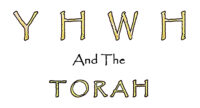1 I speak the truth in Mashiaḥ, I do not lie, my conscience also bearing me witness in the Ruaḥ ha’Qodesh,
2 that I have great sadness and continual grief in my heart.
3 For I myself could have wanted to be banished from Mashiaḥ for the sake of my brothers, my relatives according to the flesh,
4 who are Yisra’ĕlites, whose is the adoption, and the esteem, and the Covenants, and the giving of the Torah, and the worship, and the promises,
5 whose are the fathers, and from whom is ha’Mashiaḥ according to the flesh, who is over all, baruḵ of 𐤉𐤄𐤅𐤄 forever. Amĕn.
6 However, it is not as though the Word of 𐤉𐤄𐤅𐤄 has failed. For they are not all Yisra’ĕl who are of Yisra’ĕl,
7 neither are they all children because they are the seed of Aḇraham, but, “In Yitsḥaq your seed shall be called.”
8 That is, those who are the children of the flesh, these are not the children of Elohim, but the children of the promise are reckoned as the seed.
9 For this is the word of promise, “At this time I shall come and Sarah shall have a son.”
10 And not only so, but Riḇqah having conceived by one, our father Yitsḥaq.
11 Yet, before they were born or had done any good or evil – in order that the purpose of Elohim, according to choice, might stand, not of works but of Him who calls –
12 it was said to her, “The greater shall serve the lesser,”
13 as it has been written, “Ya’aqoḇ I have loved, but Ĕsaw I have hated.”
14 What, then, shall we say? Is there unrighteousness with Elohim? Let it not be!
15 For He says to Mosheh, “I shall favour whomever I favour, and I shall have compassion on whomever I have compassion.”
16 So, then, it is not of him who is wanting, nor of him who is running, but of Elohim who shows favour.
17 For the Scripture says to Pharaoh, “For this same purpose I have raised you up, to show My power in you, and that My Name be declared in all the earth.”
18 So, then, He favours whom He wants, and He hardens whom He wants.
19 Then you shall say to me, “Why does He still find fault? For who has resisted His counsel?”
20 But who are you, O man, to talk back to Elohim? Shall that which is formed say to him who formed it, “Why have you made me like this?”
21 Does not the potter have authority over the clay, from the same lump to make one vessel for value and another not for value?
22 And if Elohim, desiring to show wrath, and to make His power known, with much patience tolerated the vessels of wrath prepared for destruction,
23 and that He might make known the riches of His esteem on vessels of compassion, which He had prepared beforehand for esteem,
24 even whom He called, not only us of the Yahuḏim, but also of the gentiles?
25 As He says also in Hoshĕa, “I shall call them My people, who were not My people, and her beloved, who was not beloved.”
26 “And it shall be in the place where it was said to them, ‘You are not My people,’ there they shall be called sons of the living Elohim.”
27 And Yeshayahu cries out on behalf of Yisra’ĕl, “Though the number of the children of Yisra’ĕl be as the sand of the sea, the remnant shall be saved.
28 For He is bringing a matter to an end, and is cutting it short in righteousness, because 𐤉𐤄𐤅𐤄 shall cut short a matter on the earth.”
29 And as Yeshayahu said before, “If 𐤉𐤄𐤅𐤄 of hosts had not left us a seed, we would have become like Seḏom, and we would have been made like Amorah.”
30 What shall we say then? That gentiles not following after righteousness, have obtained righteousness, even the righteousness of belief,
31 but Yisra’ĕl following after the Torah of righteousness, has not arrived at the Torah of righteousness.
32 Why? Not because of belief, but as by works of Torah. For they stumbled at the Stone of stumbling.
33 As it has been written, “See, I lay in Tsiyon a Stone of stumbling and a Rock that makes for falling, and everyone who is believing on Him shall not be put to shame.”
